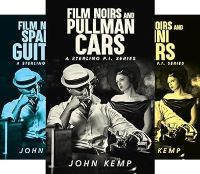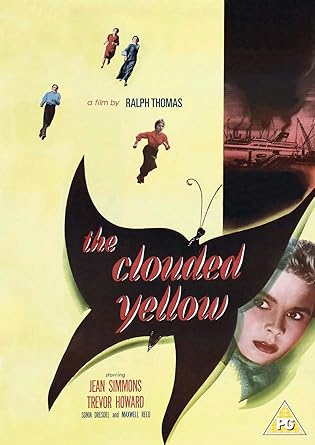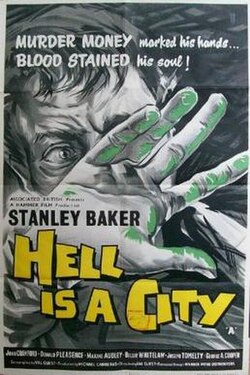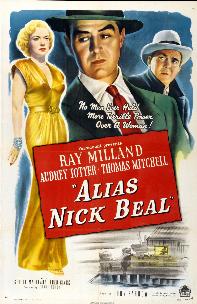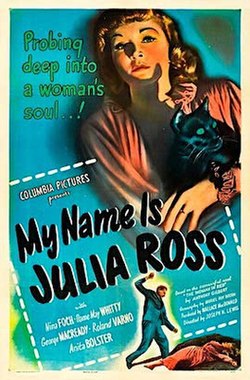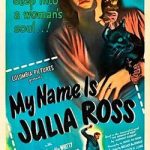
Film Noir Flashback/My Name is Julia Ross
May 18, 2025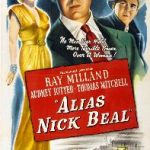
Film Noir Flashback/Alias Nick Beal
July 19, 2025I post reviews (Film Noir Flashback) of movies from, and inspired by, Hollywood’s Golden Age of Noir, the 1940s and 1950s. I am a film noir enthusiast. Maybe, like me, you are looking to enjoy films that are different, or of a different era. Films you may not have seen, ones encompassing cynical detectives, seductive femme fatales, flawed sidekicks all tossed together into intricate plots. Not forgetting the snappy dialogue too.
Backstory: Film Noir has its roots in German expressionist cinematography and American crime fiction. During the 1930s Hollywood became a perfect storm of film artists fleeing the threat of Nazi Germany, emigrating to America, and specifically to the Film studios of Hollywood. This included great directors such as Fritz Lang, Jaques Tourneur, Michael Curtiz and Robert Siodmak.
This new dramatic visual style combined with American hardboiled crime stories (noir fiction), emerged during the Great Depression and produced many classic noirs. Some of these writers include: Raymond Chandler, James M. Cain, Dashiell Hammett, Patricia Highsmith, Jim Thompson and Mickey Spillane.
I hope to showcase some of these memorable noir movies here for you. And advance apologies for a mixture of British and US English occasionally and potential spoilers, although I will always try to avoid revealing the full ending.
Inspired by hardboiled detective stories and film noir, I have written the Sterling Private Investigator Series, set in present-day London. I have also posted a link to some of my books at the bottom of the page. For more of my Film Noir Flashback blogs: https://johnkempauthor.com/blog-film-noir-reviews/
Today’s Film Noir Flashback is:
The Clouded Yellow
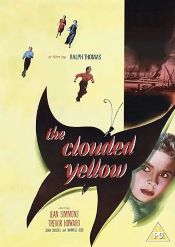
“They’re trained to look one thing
and think another.”
Film Studio: Carillion Films 1950 B&W
Director: Ralph Green
Original Music: Benjamin Frankel
Cinematography: Geoffrey Unsworth
Film Editor: Gordon Hales
Story: Janet Green
Screenplay: Eric Ambler, Sydney Box
Main Actors: Jean Simmons, Trevor Howard, Sonia Dresdel, Maxwell Reed
Produced by: Betty E. Box
Run time: 95 minutes
Preview
The Clouded Yellow is a 1950 British mystery film directed by Ralph Thomas and produced by Betty E. Box for Carillon Films. It follows in the footsteps of great British suspense films such as The 39 Steps (1935), The Lady Vanishes (1938) and Night Train to Munich (1945). The film leads are Jean Simmons (who had recently starred in the 1950 film; So Long at the Fair) and Trevor Howard (who had starred in the 1949 film; The Third Man).
I do love black and white cinematography, but I really enjoyed the colourized version too. Here is the link: https://www.youtube.com/watch?v=Ozz1Mf9MJtw
Synopsis
Note: The Clouded Yellow (Codius Croceus) is a migratory butterfly originally from Europe.
The story begins with Major David Somers (Trevor Howard), a member of the British Secret Intelligence Service, returning to England from an overseas mission.
We first see Somers lighting a cigarette before checking in at the customs & immigration desk. The next reel sees him driving (top down), in a classic 1950 convertible (Jaguar or an MG TD maybe) across London going past Big Ben and Parliament Square. He parks up in a leafy area called Lincoln Inn Fields, in Holborn. Stepping inside the residential-looking office at 12 New Square, he is greeted by “Mac”, at reception. “I’ll tell Mr Chubb you are here,” Mac says, replacing the interphone and wincing as Somers enters the Secret Service Chief’s office. What is Mac privy to?
What follows is unexpected; Somers is informed by Chubb (Andre Morell), he is surplus to requirements (canned) due to his bungling of an operation and failing to return his appointed target. Somers is told to return to “real-life” and the real world; to walk away from the Secret Intelligence Services and retire.
“Real?” Somers queries, “how do I start?” “Well, to begin with,” Chubb says and stretches out his open hand, “you stop carrying a gun.” Somers reluctantly hands his weapon over. Hopefully, he won’t be needing that gun in his next position.
After Somers leaves, Chubb telephones Shepley (Kenneth More) who is commandeered to keep tabs on the retired agent. Shepley is quick to show up at the pub Somers has recently frequented. Shipley gives him a slap on the back, “Back again, eh.” This is a friend Somers shouldn’t trust… “What do you do for a living? Somers asks. “Nothing, old boy,” Shipley lies. Quite why they have to keep tabs on Somers is slightly unclear although he did half-heartedly propose writing a feature about “The Real Life Story of the Secret Service”… That isn’t exactly going to enamour him to his ex-employer now, is it? Not to mention the Official Secrets Act.
Confronted by the reality of said real life, (civvy street), Somers pays a visit to an employment agency and is offered a job in the country cataloguing butterflies. “Do I need any knowledge of butterflies?” he asks. No, just a sound education and an amiable disposition is the comeback. And no guns.
Somers accepts the opportunity, driving out to a country house belonging to Nicholas (Barry Jones) and Jess Fenton (Sonia Dresdel). Asking for directions, he gives a lift to Hick, the gamekeeper (Maxwell Reed), on the drive into the rural retreat.
After Somers starts his new position, he discovers a few things (when he is not pinning and cataloguing those dead butterflies…): Jess Fenton is having an affair with Hick, a crude and obnoxious individual. The gamekeeper, however, appears to have a fixated desire towards a troubled young woman called Sophie Malraux (Jean Simmons). She is the attractive niece of the Fentons. Though, Hick is arrogant and acts brutish towards her. He’s definitely not her type but the new visitor just might be…
Over a time, Somers does indeed take a liking to Sophie, first coming across her playing the piano alone late one night. She is fragile and emotionally disturbed. When she was a child her father shot her mother dead, and then committed suicide. Subsequently, Sophie has tried to supress the harrowing memory. The Fentons have since become her guardians, taken her in, and helping with her rehabilitation. Though, we wonder, is she “always getting muddled” or is she being gaslighted? And everything in the country house may not be quite as sedate as the butterflies in those cases…
When, one night, Hick is murdered on the estate grounds, suspicion immediately falls on Sophie, as her bloodstained coat is found nearby to the body. With an impending arrest, Somers helps Sophie evade capture and uses his network of secret service contacts and espionage skills to evade the police. Somers and Sophie flee together to Newcastle and cross-county to The Lake District (Ullswater) and then Liverpool with hopes of escaping the country by way of ship to France. The police are closing in. Chubb has ordered Shipley to find Somers too. “We don’t want this in the newspapers,” he says. Bet they wished they’d kept him on now.
An unexpected twist occurs and the denouement is dramatically played out over the rooftops, the railways yards and tracks of Liverpool station.
Things to like
Quotes
Chubb: “Yes, quite a good record until now.”
Somers: “Cant I make one mistake?”
Chubb: “No.”
***
Somers: “What is the job?
Employment Agent: “Cataloguing butterflies.”
Somers: “Do I have to know anything about them?”
Employment Agent: “Well no… No. The only necessary qualification seems to be a sound general education and an amiable disposition.”
***
Somers: “Don’t you ever get tired of butterflies?”
Sophie: “I get tired of people first.”
Somers: “Well of course. But I’ve only had three weeks with butterflies. What do you do when you get tired of people? You can’t stick pins through their middles…”
Sophie: “I think sometimes I’d like to.
***
Sophie: “… Because I’ve remembered…”
Somers: “Remembered what?”
Sophie: “That’s how it was when I saw my mother and father… Someone was there with a gun.”
Somers: “I thought you found them first.”
Sophie: “That’s what Jess said.”
Must-see scene
The first time we are introduced to Major Somers, we see that Trevor Howard has great screen presence and, not only that, he plays the protagonist (in an understated way); a likable character, someone we will root for. You do get the sense Somers is the sort of fellow who completes a mission in a day or so, and is back smoking his pipe, drinking a whisky by sundown, his blazer and tie barely crinkled or creased, and his shoes un-scuffed. He’s old school alright and seems a thoroughly decent chap. Though, we don’t know exactly what he has had to do on those secret missions… Though I would speculate his charm offensive might be as useful a weapon as his gun is.
Entering HQ: Somers greets the Secret Service Chief (Andre Morell), and says, “Same old room, nothing changes.” Chubb ominously replies: “People do, they get older.” I think we can already sense what may be coming…
Chubb highlights a mistake Somers has recently made in not bringing “Mark Vann back”. Chubb reads Somers’ exemplary service record (including wartime missions to Bavaria, capture and then escape). “Yes, quite a good record – until now,” Chubb admits.
“Aren’t I allowed one mistake? Somers queries. “No,” is the curt reply. And as quick as that, Somers is surplus to requirements, and needing to dust off his curriculum vitae. He’s told to walk away and re-enter “real life”. “I used to be a newspaper man once,” he reflects aloud as if dazed by the news. Somers is wounded but takes it on the chin with that great reserve of his. Besides, what else can he do?
Somers is left with that sinking feeling of being out of work. He has known little else aside from his secret missions for the last decade… His employer considers him as washed up. Harsh treatment for a man who has apparently done so much in service of his country (even Chubb admits as much). This sets up our interest in the story: what does an ex-Intelligence man such as Somers, do next? Is it really possible he will move, get a job and do, “something quiet in the country” as his boss encourages him? And will butterfly collating really replace those forays behind enemy lines? Gun or no gun. Highly unlikely, I suspect!
Summary
This may or may not be a film noir, but it does tick a few film noir boxes and if failing that full noir qualification, it is a superior British thriller. Trevor Howard and Jean Simmons are two British cinema greats, and their performances are the glue that hold the film together. They are ably supported by Barry Jones, Kenneth More and Sonia Dresdel.
While Nicholas Fenton is busy collecting those Clouded Yellow butterflies, might the title also allude to another butterfly: Sophie (Jean Simmons) and her clouded memories? Just a thought.
From butterfly nets to police dragnets, this starts as a psychological drama and develops something akin to Hitchcock’s The 39 Steps, and a slight nod to the Master of Suspense. If Hitchcock had directed this film himself, might it be better known, and possibly more revered? It deserves to be in my opinion.
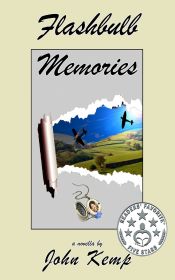
“Flashbulb Memories will have you in tears and will have you shouting for joy. I really felt both Jack and Lucy’s emotions and it was very hard to put the book down….” ~ Trudi LoPreto, Readers’ Favorite.
USA Link: Flashbulb Memories – Audio: https://shorturl.at/3gvcf eBook: https://shorturl.at/K7OQ9 Paperback: https://shorturl.at/KRkUh
UK Link: Flashbulb Memories – eBook: https://shorturl.at/iOcZA Paperback: https://shorturl.at/Z5qZv
